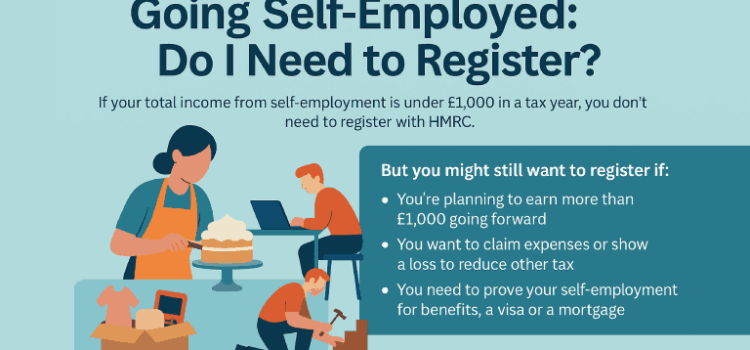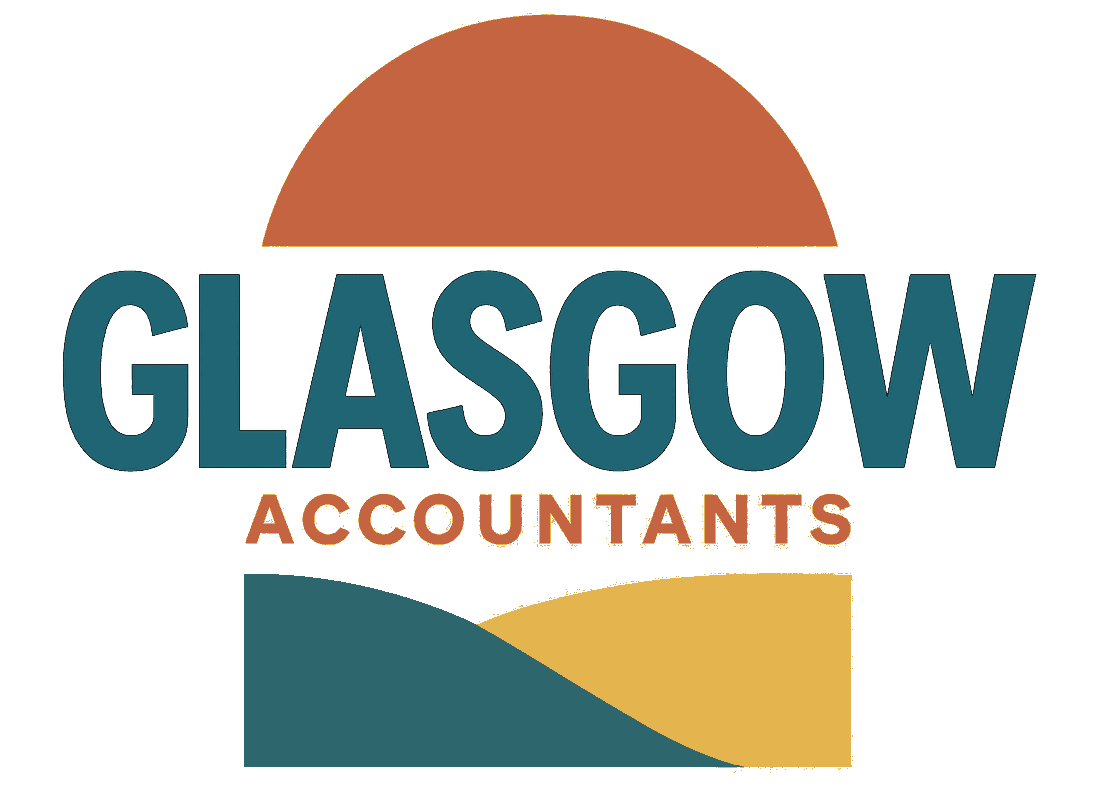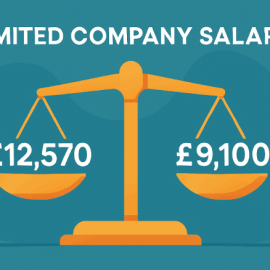
Thinking of Going Self-Employed in Glasgow? Here’s What You Need to Know
Starting your own thing—whether that’s baking cakes, fixing fences, freelancing, or side hustling on weekends—can be exciting. But the admin? That’s where most people feel overwhelmed.
If you’re based in Glasgow and thinking about registering as self-employed, this guide walks you through exactly what to do—and when.
Do You Always Have to Register?
Let’s clear this up first—because the answer’s not always “yes.”
If your total self-employed income is under £1,000 in a tax year, HMRC gives you something called the trading allowance. That means:
- No need to register
- No tax return
- No tax to pay
This applies whether you’ve sold a few things on Etsy, done a one-off garden job, or picked up a weekend gig. But this is not the same as selling your own personal items on eBay or Vinted. If you’re just clearing out stuff you already own, that’s not taxable and doesn’t count.
When Should You Register Anyway?
Even if you’re under the £1,000 mark, it might still make sense to register if:
✅ You plan to earn more in future
✅ You want to claim business expenses
✅ You’ve made a loss and want to offset it
✅ You need to prove self-employment for a mortgage, visa, or benefits
If that’s you—or you’re already over the threshold—here’s how to register.
How to Register as Self-Employed (Step by Step)
- Go to: gov.uk/register-for-self-assessment
- Choose “I’m self-employed”
- Set up a Government Gateway account (if you don’t have one)
- Fill in your details (name, NI number, DOB, business start date, etc.)
- Wait for your UTR (Unique Taxpayer Reference) to arrive by post
Once registered, HMRC will expect you to file a Self Assessment tax return every year.
📆 Example: If you start trading in July 2025, your first return is due by 31 January 2027.
What Comes After Registration?
Here’s what you’ll want to get sorted early on:
1. Start Recording Income and Expenses
This can be as simple as a spreadsheet. If your turnover is under £50,000, you’re outside Making Tax Digital (until 2026/27), so paper or Excel is fine.
Record:
- All business income
- All business expenses (fuel, tools, phone, subscriptions, etc.)
- Business use of your car or phone (if relevant)
🧾 Bonus tip: Keep every receipt and invoice, even digital ones.
2. Set Aside Money for Tax
You’ll likely owe Income Tax and National Insurance on profits. A good rule of thumb is to set aside 20–25% of what you earn.
Open a second bank account (personal or business) and shift the money across regularly.
3. Know the Key Deadlines
- 5 October – Register for Self Assessment after your first trading year
- 31 January – File your tax return and pay your bill
Miss these, and HMRC can charge penalties—even if you didn’t owe any tax.
4. Understand National Insurance
If you’re self-employed in 2025/26:
- Class 4 NIC: 6% on profits between £12,570 and £50,270, then 2% above
- Class 2 NIC has been scrapped, but you may voluntarily pay it to protect your State Pension if your profits are below the lower threshold (approx. £6,725)
Common Questions from Glasgow Clients
❓
Can I be employed and self-employed at the same time?
Yes—and many people are. You’ll still get taxed through PAYE on your job, and submit a Self Assessment return to declare self-employed profits.
❓
Do I need a business bank account?
Not legally. But it helps keep things tidy. Banks like Starling offer free business accounts that are perfect for freelancers and side hustlers.
❓
Can I claim for a laptop, phone or tools?
If it’s used for the business—even partly—you can usually claim. Just be fair and proportionate (e.g. 50% if your mobile is also for personal use).
❓
What if I don’t earn anything one year?
You still need to file your tax return—just enter £0 income. No tax due, no penalty (as long as it’s on time).
Want to Start Off on the Right Foot?
I speak to a lot of self-employed people across Glasgow who only get help when things start to go wrong—missed deadlines, unexpected bills, poor record keeping.
Getting it right from the beginning saves time, stress, and money.
Whether you’re just launching, already registered but feeling unsure, or want help keeping things simple—I’m happy to talk.
👉 Contact Glasgow Accountants – Clear, jargon-free support for self-employed individuals, freelancers, and new business owners across the city.

